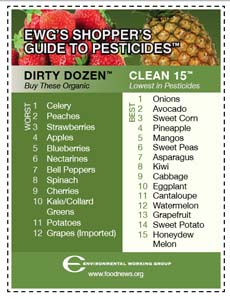TIP OF THE DAY: How To Avoid Pesticides On Vegetables & Fruit
|
|
We’ve previously written about the “Dirty Dozen” and the “Clean 15,” terms that refer to how much residual pesticide is left on produce, even after you wash and/or peel it. With tempting seasonal produce entering the market, it’s time to revisit when it pays to buy organic produce. Research has found that people who eat five fruits and vegetables a day from the Dirty Dozen list consume an average of 10 pesticides a day. Those who eat from the “Clean 15”—the 15 least contaminated conventionally-grown fruits and vegetables—ingest fewer than two pesticides daily. The Shopper’s Guide To Pesticides, from the Environmental Working Group (EWG), is a key resource for consumers aiming to eat healthier. It helps us make informed choices in order to lower our dietary pesticide load. |
|
|
There’s a downloadable pocket guide and iPhone app to help you avoid the Dirty Dozen—those conventional fruits and vegetables found to be highest in pesticides—and focus instead on the Clean Fifteen fruits and vegetables that are the lowest. The guide was developed based on data from nearly 89,000 tests for pesticide residues in produce examined between 2000 and 2008, collected by the U.S. Department of Agriculture and the U.S. Food and Drug Administration. You can find a detailed description of the criteria EWG used to develop these rankings and the complete list of tested fruits and vegetables at Foodnews.org. In order of the amount of pesticide residue: What about washing and peeling the produce?
|
||
